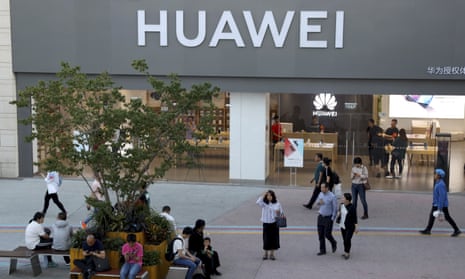The US ban on sharing technology with Huawei is a “cynically timed” blow in the escalating trade war between the US and China, the Chinese firm’s top executive in the UK has said.
Huawei denounced Donald Trump’s ban on the sharing of US tech with “foreign adversaries”, after a string of US tech companies followed Google in restricting the company’s access to their products on Monday.
Speaking to BBC Radio 4’s World At One, Huawei’s executive vice-president in the UK, Jeremy Thompson, said the dispute was about trade, not security.
“We’re in the middle of a trade war between two big countries so the timing of this is to inflict maximum hurt on our organisation. We’re a football in between this trade war,” he said.
After failing to convince European allies to block the use of Huawei technology, the Trump administration issued an executive order last week aimed at cutting off the Chinese firm from US suppliers.
But on Monday, the US temporarily eased some restrictions imposed last week, in a sign of how the prohibitions on Huawei may have far-reaching and unintended consequences.
For the next 90 days, the US Commerce Department will allow Huawei to purchase American-made goods in order to maintain existing networks and provide software updates to existing Huawei handsets.
“It appears the intention is to limit unintended impacts on third parties who use Huawei equipment or systems,” said Washington lawyer Kevin Wolf, a former Commerce Department official. “It seems they’re trying to prevent network blackouts.”
Google confirmed on Monday it was restricting Huawei’s access to the Android operating system on which the Chinese firm’s mobile devices depend. Reuters reported on Sunday that Google had suspended all business with Huawei that required the transfer of hardware, software and technical services, except those publicly available.
Reuters reported on Monday that Lumentum Holdings, which supplies parts to Apple’s Face ID feature, is also restricting business with Huawei. Bloomberg reported that other industry giants, including Intel Corp and Qualcomm Inc, have told their employees that they will not supply Huawei until further notice.
The latest restrictions are likely to hit Huawei’s European business, its second-biggest market, because it licenses many of its mobile phone services from Google in Europe.
Trump’s crackdown saw global equity markets fall on Monday, with chipmaker stocks in Europe and on Wall Street sliding. Apple’s shares fell 3.13%, Lumentum Holdings fell 4.1%, Infineon lost 4.56% and Franco-Italian chipmaker STMicroelectronics tumbled 9.18%. The PHLX Semiconductor Index of 30 US industry-related companies fell 4.02%.
Thompson told the BBC that Huawei had developed its own operating system it could use instead of Android; that was its “plan B” only if it was impossible to work with Google.
“This is 100% about trade and we did expect something along these lines – not perhaps as cynically timed as it is right now, but we are developing parallel operating systems – that’s why we invest $14bn a year in R&D, and we have used some of that investment to find alternatives,” Thompson said.
Huawei has promised to continue providing security updates and after-sale services for its smartphones and tablets. The firm did not clarify what the ban would mean for new Huawei phones but instead underscored its previous cooperation with Android.
“Huawei has made substantial contributions to the development and growth of Android around the world,” it said. “As one of Android’s key global partners, we have worked closely with their open-source platform to develop an ecosystem that has benefited both users and the industry.”
A spokesman for China’s ministry of foreign affairs, Lu Kang, said Beijing would “support Chinese enterprises in defending their legitimate rights through legal methods”.
Observers say Chinese countermeasures could include encouraging a consumer boycott of US goods, such as Apple products. China is Apple’s third-largest market by sales volume. Increased inspections or added regulatory hurdles are other options. In 2014, amid US accusations of Chinese cyber-theft, Microsoft offices in China were subjected to raids by inspectors.
In an interview in March with the German publication Die Welt, Richard Yu, the head of the company’s consumer division, said the company had a “plan B”. He said: “We have prepared our own operating system. Should it ever happen that we can no longer use these systems, we would be prepared.”
Chipmakers such as Intel, Qualcomm, Xilinx and Broadcom have told employees they will not supply chips to Huawei until further notice, Bloomberg reported on Monday, citing people familiar with the matter.
Other US companies that could be implicated in the Huawei ban are Intel and Microsoft, which provide chips and software for Huawei’s computers. Intel declined to comment “at the moment”, but Bloomberg reported that the chipmaker had told employees that it will cease supplying Huawei “until further notice”. Microsoft did not immediately respond to queries.
Huawei, which relies on chips from the US, has reportedly been stockpiling the chips and other components in anticipation of the ban. In an interview on Saturday, the Huawei chief executive, Ren Zhengfei, said the company would be “fine” without US chips.
